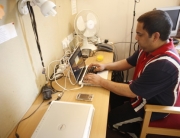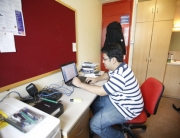Internet governance is an extremely complex and pressing issue. Complex because it is multi-layered, comprising technical standards, access issues and content questions, because different media with traditionally different regulatory systems all converge on the Internet, and because of the web’s borderless nature. It becomes ever more important as more people get online, in the developing as well as Western world, and the more integral a part of their lives the Internet becomes. As well as being an incredible resource in terms of access to information, and an unprecedented platform for free expression, the Internet is also essential to many industries.
The revelations in the Snowden leaks about NSA surveillance of governments and citizens around the world have led to increased concern about the US role in internet governance.
1. Background
Who should govern the Internet, and how, is a highly contested issue.
An ‘independent’ cyberspace?
In his 1996 ‘Declaration of the Independence of Cyberspace,’ John Perry Barlow, one of the founding members of the Electronic Frontier Foundation, beseeched the “Governments of the Industrial World” to “leave us alone”.
His sentiment might sound somewhat naively idealistic, but it sums up the some of the main issues well: “Ours [cyberspace] is a world that is both everywhere and nowhere, but it is not where bodies live… Your legal concepts of property, expression, identity, movement, and context do not apply to us. They are all based on matter, and there is no matter here. Our identities have no bodies, so, unlike you, we cannot obtain order by physical coercion. We believe that from ethics, enlightened self-interest, and the commonweal, our governance will emerge.”
Declaration of the Independence of Cyberspace: https://projects.eff.org/~barlow/Declaration-Final.html
Code is Law
Lawrence Lessig put forward the idea in his 1999 book Code, and Other Laws of Cyberspace that the Internet is in fact above all regulated by code, and therefore it is essentially governed by the bodies that create and control the technical standards of the web (see below for more info.)
Code is Law: from Harvard Magazine (2000):
http://harvardmagazine.com/2000/01/code-is-law-html
“This regulator is code—the software and hardware that make cyberspace as it is. This code, or architecture, sets the terms on which life in cyberspace is experienced. It determines how easy it is to protect privacy, or how easy it is to censor speech. It determines whether access to information is general or whether information is zoned. It affects who sees what, or what is monitored. In a host of ways that one cannot begin to see unless one begins to understand the nature of this code, the code of cyberspace regulates.”
National governments
National governments have a key role to play in terms of assuring physical infrastructure for their citizens, but the fact that the Internet is not contained within borders means that it resists national regulation in terms of structure, and often in terms of content. IP addresses, for example, are conceptual rather than physical, and technical standards must be determined internationally.
National governments do have significant responsibility for law enforcement in the content sphere, including copyright, defamation, and other illegal material.
An example of national regulation is the UK’s heavily criticized ‘porn filter,’ which, although aiming to protect children, has been described as Chinese-style censorship. ISPs have been asked to introduce network-level filters that block pornography and other ‘inappropriate’ content, but have been found to block many legitimate sites. It is possible to opt-out of these, but there are fears that parents and others could prevent children from accessing resources they need.
Articles on porn censorship and filtering:
http://www.indexoncensorship.org/2014/01/uks-web-filtering-seems-blocking-common-sense/
http://www.bbc.co.uk/news/technology-25962555
UN/international: from WSIS to IGF
The International Telecommunication Union (see below) was the key organizer of the World Summit on the Information Society, and the subsequent Internet Governance Forum. The WSIS met in Geneva in 2003 and Tunis in 2005, and established a Working Group on Internet Governance that in turn convened the Internet Governance Forum (IGF), which is an annual meeting of stakeholders from government, technical bodies, and civil society. The goal of WSIS was to take steps towards establishing the foundations of an Information Society for all, recognizing that the digital revolution was changing the way people thought and behaved, and that a digital divide was emerging. Improving ICTs in developing countries was seen as a way to move towards the Millenium Development Goals.
Heads of state don’t attend IGF and it has no true decision-making authority: it is an arena for debate. Multistakeholderism is a key principle of the IGF: many believe it is vital to include civil society. It not be a perfect solution, as the more players that are involved, the more complex any decision-making becomes, but this is arguably a price worth paying to keep the Internet free from centralized control.
Although some countries are pushing for more UN control over the Internet, there are fears among Western powers that a more UN-dominated approach to Internet government could lead to more regulation, and more influence of countries such as China which have very different attitudes to how the Internet should be used.
A WSIS+10 High-Level Event will be held in the ITU Headquarters, Geneva from 10-13 June 2014, designed to “review the progress made in the implementation of the WSIS outcomes under the mandates of participating agencies, and to take stock of achievements in the last 10 years based on reports of WSIS Stakeholders, including those submitted by countries, Action Line Facilitators and other stakeholders.” It is coordinated by ITU and coorganised by ITU, UNESCO, UNCTAD and UNDP.
The next Internet Governance Forum will be held in Istanbul from 2-5 September 2014.
WSIS: https://www.itu.int/wsis
IGF: http://www.intgovforum.org/cms/
MDGS: http://www.un.org/millenniumgoals/
LSE MPP coverage of IGF 2013: https://blogstest.lse.ac.uk/mediapolicyproject/tag/internet-governance-series/
2. Key Documents
US government to pass on ICANN responsibilities
As noted, there has for some time been suspicion and hostility to ICANN’s connection to the US government. As well as the Montevideo statement, a European Commission statement released February 12 2014 (reported by the Guardian) said: “Recent revelations of large-scale surveillance have called into question the stewardship of the US when it comes to internet governance… Given the US-centric model of internet governance currently in place, it is necessary to broker a smooth transition to a more global model while at the same time protecting the underlying values of open multi-stakeholder governance.”
ICANN has a contract with the US Department of Commerce. But on March 14, the Department’s National Telecommunications & Information Administration announced its intent to transition key domain name functions to the global multistakeholder community, “to support and enhance the multistakeholder model of Internet policymaking and governance.”
NTIA’s statement: http://www.ntia.doc.gov/press-release/2014/ntia-announces-intent-transition-key-internet-domain-name-functions
ICANN’s statement: http://www.icann.org/en/news/press/releases/release-14mar14-en
UN response: http://www.un.org/sg/statements/index.asp?nid=7530
European Commission press release on “Commission to pursue role as honest broker in future global negotiations on Internet Governance,” February 12 2014 http://europa.eu/rapid/press-release_IP-14-142_en.htm
The transfer is expected to happen by September 2015. What happens next?
3. Key Participants
ICANN – The Internet Corporation for Assigned Names and Numbers http://www.icann.org/
ICANN coordinates the Internet Assigned Numbers Authority (IANA) functions: IANA registers and keeps lists of unique identifiers – IP addresses and domain names – on the Internet so that connected devices can communicate with one another. The domain name system essentially puts names to Internet Protocol (IP) addresses, which would otherwise just be strings of numbers and not easy to remember. IANA controls the protocol parameters
IANA in 240 seconds: https://www.youtube.com/watch?v=D__mAX-2sXo
Meet the seven people who hold the keys to worldwide internet security: http://www.theguardian.com/technology/2014/feb/28/seven-people-keys-worldwide-internet-security-web
ITU – The International Telecommunication Union http://www.itu.int
The ITU is the United Nations agency that specializes in information and communication technologies (ICTs). It is “committed to connecting all the world’s people,” supporting “everyone’s fundamental right to communicate.”
It allocates global radio spectrum and satellite orbits, develops technical standards that ensure networks and technologies connect, and works to improve access to ICTs to underserved communities. Headquartered in Geneva, it has a membership of 193 countries and more than 700 private-sector entities and academic institutions.
It was the lead organizer of the World Summit on the Information Society.
ISOC – The Internet Society http://www.internetsociety.org
Its mission is “to promote the open development, evolution and use of the Internet for the benefit of all people throughout the world,” focusing on open development of standards, governance, public policy and education, specifically in developing countries.
It is a membership-based non-profit headquartered in the US and Switzerland, with regional bureaus based around the world.
It is the parent company of the IETF.
IETF – The Internet Engineering Task Force http://www.ietf.org/
The IETF’s mission is “to make the Internet work better” from an engineering point of view, rather than looking at policy and business questions. It is essentially a loose network of volunteer engineers (who might be funded by their employers or sponsors) who work on different areas, under an Internet Engineering Steering Group that is responsible for technical management of IETF activities and the Internet standards process. It is open to all engineers who want to participate, and has an annual meeting which is open to any of the network who are prepared to come and pay.
W3C – The World Wide Web Consortium http://www.w3.org/
W3C is led by web inventor Tim Berners Lee and aims to “lead the World Wide Web to its full potential by developing protocols and guidelines that ensure the long-term growth of the Web.” Most of its work is based around the standardization of web technologies. It has staff based at four host research institutions in the US, Europe, China and Japan and members around the world.
APPENDIX
Related Press Samples and Events
Surveillance (see separate guide)
Timeline of Snowden revelations: http://america.aljazeera.com/articles/multimedia/timeline-edward-snowden-revelations.html
The Guardian’s reporting on the NSA files: http://www.theguardian.com/world/the-nsa-files?INTCMP=mic_232382
The revelations have led to fears of ‘Balkanisation’ of the Internet: the idea that countries will try to fence off their networks to stop foreign governments from spying on their citizens’ data.
http://www.theguardian.com/world/2013/nov/01/nsa-revelations-balkanisation-internet
Montevideo statement http://www.w3.org/2013/10/montevideo.html.en
On 7 October 2013 the leaders of organizations responsible for coordination of the Internet technical infrastructure issued a statement in which they called for “accelerating the globalization of ICANN and IANA functions, towards an environment in which all stakeholders, including all governments, participate on an equal footing.” This was widely interpreted as a move to reduce ICANN’s links with the US, in light of the NSA spying revelations.
NETmundial: Global Multistakeholder Meeting on the Future of Internet Governance http://netmundial.br/
São Paolo, 24-25 April
Netmundial was announced by the Brazilian government in reaction to the Snowden revelations. Brazilian president Dilma Roussef has been particularly vocal in her opposition to NSA spying. It aims to draw up broad principles for internet governance, including how to protect human rights and privacy online.
It is organized by CGI.br, the Brazilian Internet Steering Committee responsible for establishing strategic directives related to the use and development of the Internet in Brazil, and /1net, a “neutral, focused initiative” created following the Montevideo Statement, facilitated by authors of the statement. The High-Level Multistakeholder committee is chaired by the Brazilian Minister of Communications, Paulo Bernardo Silva, and comprises 12 countries as co-hosts, 12 MSH community representatives from civil society, the private sector, academia and the technical community, and 3 from international organisations, the UN and EC. The committees have received an “unexpectedly large number of submissions.”
Roussef’s statement to the UN General Assembly in September 2013 http://gadebate.un.org/sites/default/files/gastatements/68/BR_en.pdf
Brazil moves towards an internet bill of rights: http://www.indexoncensorship.org/2014/04/brazil-moves-toward-internet-bill-rights/
Net neutrality (see separate guide)
Net neutrality has been under intense discussion since a US court ruling in January 2014 that overturned rules that had guaranteed equal pricing and treatment for internet data.
U.S Court Throws Out Net Neutrality Rules – Explained: https://blogstest.lse.ac.uk/mediapolicyproject/2014/01/16/u-s-court-throws-out-net-neutrality-rules-explained/









